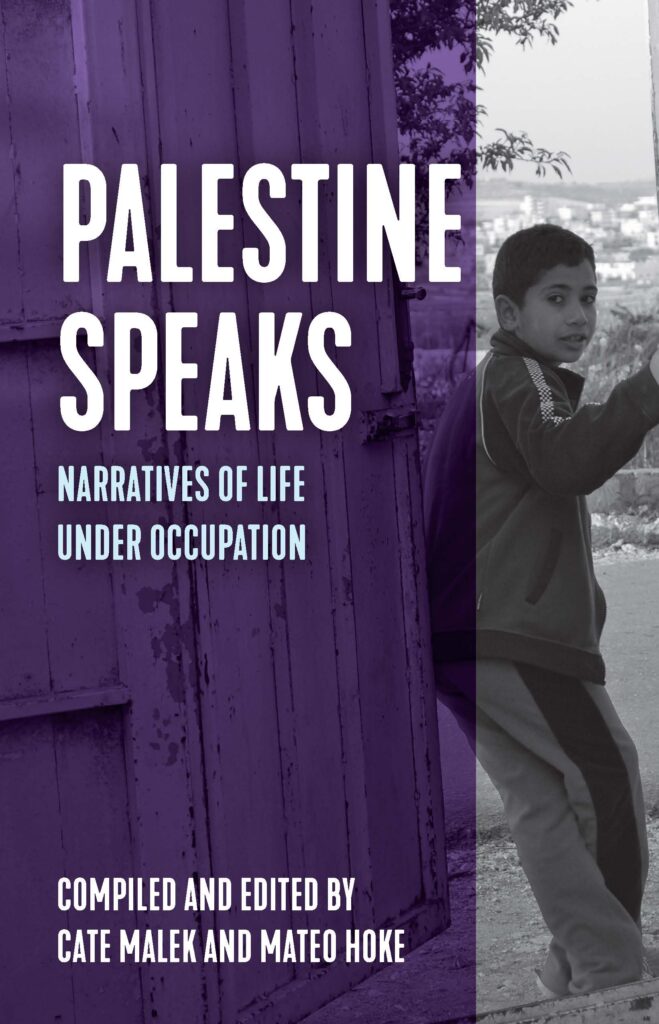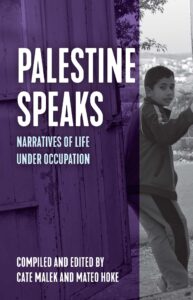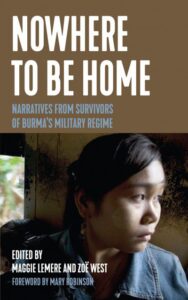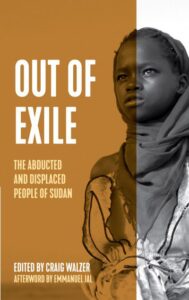The Voice of Witness book series amplifies the stories of people directly impacted by—and fighting against—injustice. We use an oral history methodology that combines ethics-driven practices, journalistic integrity, and an engaging, literary approach.
The books explore issues of inequity and human rights through the lens of personal narrative. Each project aims to disrupt harmful narratives by supporting historically marginalized or silenced communities to tell their own stories in their own words.
Book clubs are useful tools for engaging and interacting with these oral histories and the issues they highlight. Find our handout with guidance on planning and facilitating one here.
Use the questions below to start a book club for Palestine Speaks: Narratives of Life Under Occupation.

Discussion Questions:
- In their introduction to the book, editors Cate Malek and Mateo Hoke describe the checkpoints, barriers, and roadblocks positioned all over the West Bank. How do you think these militarized checkpoints impact Palestinians’ sense of safety, dignity, and concept of
“home?” - Ibtisam, who has a physical disability from having had polio as a child, describes her struggle to climb past stone barriers and walk through checkpoints to get home from her work at the cultural center in Bethlehem. How might living under occupation create a complex trauma for people who are already marginalized due to gender, sexuality, religion, or disability?
- In her narrative, Ibtisam says “I’ve traveled across Europe, but I prefer to live in Palestine . . . if people I love die, then I want to die with them; if they live, I want to live with them.” Where do you think this deeply-rooted loyalty to Palestine comes from? Is it unique to
people living under occupation or war, or is it a universal impulse? Explain your thoughts. - As a young man, Palestinian lawyer Abdelrahman Al-Ahmar was detained and tortured by Israeli soldiers after throwing stones and Molotov cocktails at settlers in the refugee camp. He describes being kept outside naked in the snow with a bag over his head, enduring constant beatings, and being kept awake for days at a time. Abdelrahman says that “people who are really religious have a hard time with this kind of abuse sometimes” because when they pray to God and it doesn’t stop, they are mentally broken. Do you agree or disagree that the kind of torture Abdelrahman endured is harder for people who are “really religious?” Why or why not?
- Amiad Cohen, the Israeli “executive” of the Eli settlement in the West Bank, says about his time serving in the Israeli Army: “In Gaza we were mostly fighting Hamas. But we couldn’t always distinguish who was Hamas and who was not, and my soldiers and I had plenty of talks about how to be moral about war.” Do you believe it is possible to be “moral about war?” Why or why not? In what was does the dilemma Amiad described apply to all wars?
- Ghassan tells a funny story about the lack of milk during a Palestinian boycott of Israeli products and “eighteen wanted cows.” What role do you think humor can play in conflict?
- Jamal Bakr, a lifelong fisherman from Gaza, has lived in fear that he will be shot by Israeli soldiers ever since Israel imposed a naval blockade in 2007. Jamal says, “Every single day, I expect to be killed. Whenever I leave my home in the morning, I’m not sure I will get home alive.” What effects do you think this state of permanent anxiety has on Jamal and his family?
- Muhanned, a Palestinian artist, was arrested and jailed for his association with the PFLP (Popular Front for the Liberation of Palestine). After his release, he went back to school to make art about his experience in jail. He says that “art is resistance,” and that when he makes art, he feels “as if [he] is giving something to [his] homeland and sending [his] message to the rest of the world.” Do you believe art is, or can be, resistance? Why or why not? Can you think of other artists whose work has made an important commentary on politics or social injustice?
- Kifah Qatash says that she is “100 percent sure” that Israeli concern with security results in the arrest of Palestinians whom they perceive as a political threat. Do national security and political activism inherently conflict with each other? Should individual freedom trump national security, or vice versa? Explain your thoughts.
- Does any person or country have an inalienable right to land? If two or more countries believe they have the right to the same piece of land, what, if anything, can be done to resolve the conflict? How is this problem complicated by religion?



